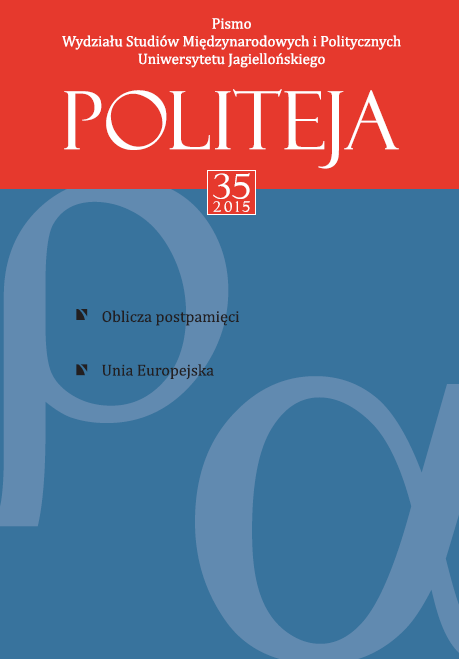Pamięć przeszłości jako bagaż czy grupowa duma? Postawa młodego pokolenia przesiedleńców z Kresów Wschodnich II Rzeczypospolitej wobec rodzinnej pamięci przeszłości
The Memory of the Past as Burden or Group Pride?
Author(s): Teresa Sołdra-GwiżdżSubject(s): Politics / Political Sciences
Published by: KSIĘGARNIA AKADEMICKA Sp. z o.o.
Keywords: collective memory of a family; memory of the past; post‑memory; the displaced from the Former Eastern Lands of the Second Republic of Poland; young generation; transmission of the past; Opole Silesia
Summary/Abstract: The article contains considerations over the formation of family‑based remembrance of the past (post‑memory) among the young generation of Kresowiacy (Poles displaced from the Former Eastern Lands belonging to Poland before WW2) living now in Opole in Silesia – a unique region of Poland. Results of empirical research indicate that the family‑related post‑memory (inherited memory), in the young generation of the displaced is not a linear string, whose endpoint is the presence. It is random and fragmentary, with different time contexts, in which there has followed a clear mix‑up of orders covering different dimensions of historical and family events. It is rather that personalistic and historical events most frequently occur as the background of the narration. Young people are most often occasional listeners rather than active researchers of the family past, in particular those traumas that until today have raised anxiety, liberated strong emotions and reminded of the “lost Arcadia”. The everyday life does not favour this type of reflection, and experienced social situations enforce participation in the Silesian regional culture. Such a shape of post‑memory is a result of a series of social processes connected with assimilative and adaptive activities aimed at forming a group of the so‑called “new autochthons”, which were undertaken by the socialist authorities. One can perceive also a hidden and unintended function of these returns to the past, which manifests itself as a wish to maintain group identity in the future through recreating and evoking traumas of the past, that is constructing the “expelled memory”. Nevertheless, the young generation of the displaced in Opole region only to a little extent are becoming its participants and receivers. The heritage of the Former Eastern Lands of Poland, remembrance of the traumas of the past make rather partially forgotten or being forgotten group luggage of the past than an element of group pride.
Journal: Politeja - Pismo Wydziału Studiów Międzynarodowych i Politycznych Uniwersytetu Jagiellońskiego
- Issue Year: 12/2015
- Issue No: 35
- Page Range: 281-294
- Page Count: 14
- Language: Polish

